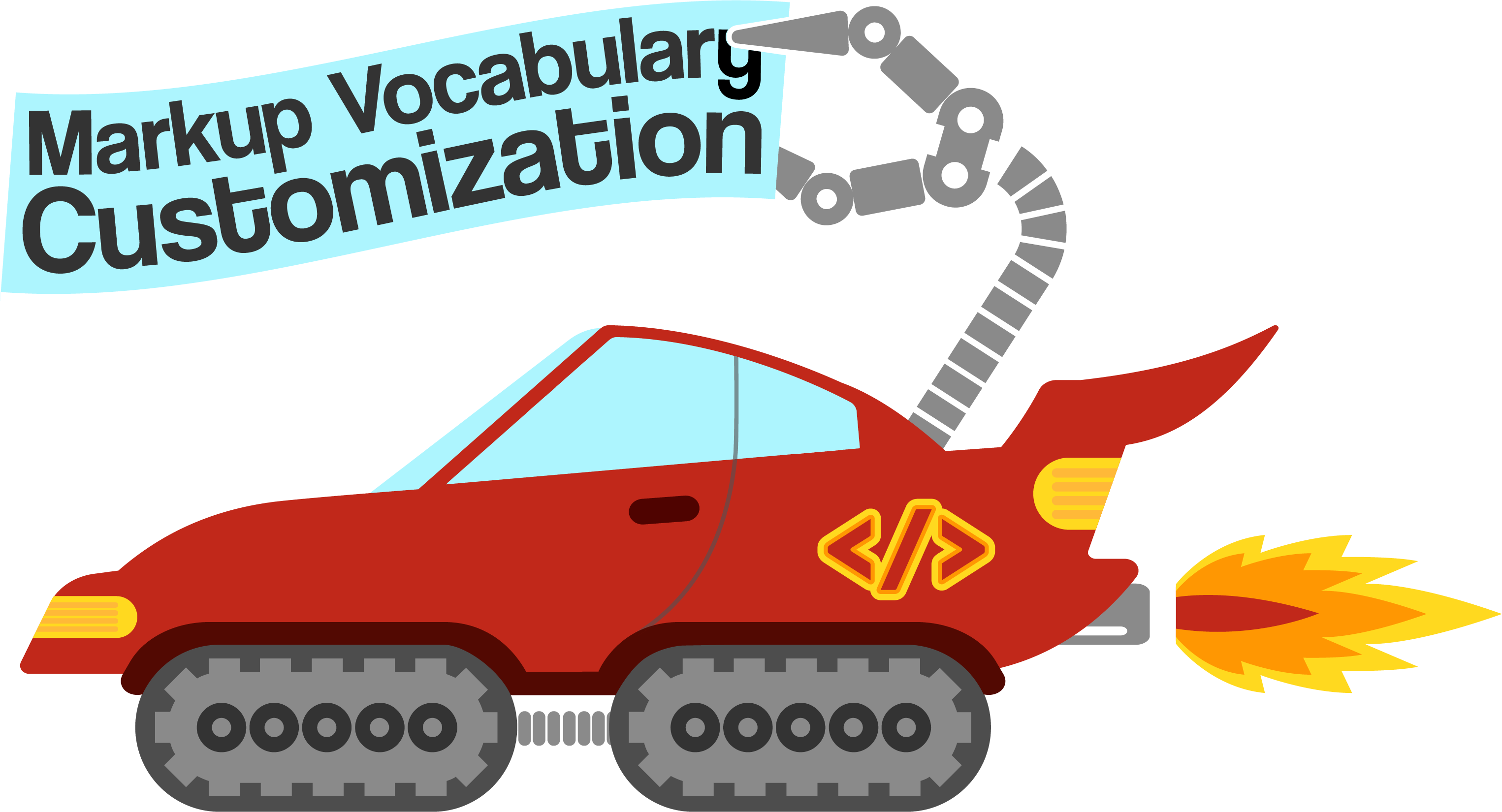
Monday, July 29, 2019
Symposium: Markup Vocabulary Customization
Monday, July 29, 2019
Conference registration & breakfast
Pick up your conference badge in the Gleason Boardroom and join us for breakfast in Baker before taking your seat in Sinequa, the conference room.
Welcome and introductions
Introduction to the Symposium
Syd Bauman, Northeastern University DSGMany shared XML vocabularies are built to be customized. Users are provided with a vocabulary, a grammar, and some documentation; various aspects of any or all of these may be modifiable by the user. Customization mechanisms often include methods to:
- narrow the schema components (removing elements or attributes)
- expand the schema components (adding new elements or attributes)
- loosen or restrict the schema (required versus optional, etc.)
- add to or change the semantics of a component
- document the customizations
Experts on 5 vocabularies, all of which are for encoding textual documents and all of which are user customizable, will each give a detailed presentation (45 minutes each) on the approach taken in that vocabulary to customization. Each of the presenters has been given a list of topics to cover in their presentation. Our hope is that this will allow the audience to:
- learn enough detail about each vocabulary to understand the technical aspects of the customization mechanism, and
- compare the customization mechanisms head to head.
Vocabulary Customization in JATS, The Journal Article Tag Suite
Debbie Lapeyre, Mulberry Technologies, Inc.The Journal Article Tag Suite (JATS), also known as ANSI/NISO Z39.96-2019, is a set of tag sets used for journal articles. JATS is used by publishers, archives, search and display tools, and libraries for the encoding and interchange of journal articles. In addition, JATS has been customized to create BITS (the Book Interchange Tag Suite) and NISO STS (ANSI/NISO Z39.102-2017 Standards Tag Suite). After a brief introduction to JATS, we will discuss the mechanisms built in to JATS for customization. https://jats.nlm.nih.gov
Break
Vocabulary Customization in Akoma Ntoso
Monica Palmirani, University of BolognaAkoma Ntoso (Architecture for Knowledge-Oriented Management of African Normative Texts using Open Standards and Ontologies) is an international technical standard for representing executive, legislative, and judiciary documents in a structured manner. It is a legal XML vocabulary and it suggests also a naming convention for providing unique identifiers to legal sources based on the FRBR model. Akoma Ntoso defines a set of simple, technology-neutral electronic representations of parliamentary, legislative, and judiciary documents for e-services in a worldwide context and provides an enabling framework for the effective exchange of machine readable parliamentary, legislative, and judiciary documents such as legislation, debate records, minutes, judgements, etc. After a brief introduction to Akoma Ntoso, we will discuss the mechanisms built in to Akoma Ntoso for customization. http://docs.oasis-open.org/legaldocml/akn-core/v1.0/akn-core-v1.0-part1-vocabulary.html
Vocabulary Customization in DocBook
Norm WalshDocBook is a general purpose XML vocabulary particularly well suited to books and papers about computer hardware and software (though it is by no means limited to these applications). DocBook has been under active maintenance for more than 20 years; it began life as an SGML document type definition. Because it is a large and robust schema, and because its main structures correspond to the general notion of what constitutes a “book,” DocBook has been adopted by a large and growing community of authors writing books of all kinds. After a brief introduction to DocBook, we will discuss the mechanisms built in to DocBook for customization. https://docbook.org
Lunch
Please check computer bags, backpacks, brief cases, suitcases, and other bags and bundles with conference staff in the Gleason Boardroom. Lunch is a serve-yourself buffet with limited space.
Vocabulary Customization in TEI
Raffaele Viglianti, Maryland Institute for Technology in the Humanities at the University of MarylandTEI, the Text Encoding Initiative, was founded in 1987 to develop guidelines for encoding machine-readable texts of interest to the humanities and social sciences. The TEI is a text-centric community of practice in the academic field of digital humanities, operating continuously since the 1980s. The community currently runs several mailing lists, holds an annual conference, and maintains an eponymous technical standard, an online journal, a wiki, a GitHub repository, and a toolchain. The TEI Guidelines, which collectively define an XML format, are the defining output of the community of practice. The format differs from other well-known open formats for text (such as HTML and OpenDocument) in that its main mission is for encoding *extant* texts such that they are amenable to scholarly processing. After a brief introduction to the TEI, we will discuss the mechanisms built in to the TEI for customization. https://tei-c.org/guidelines/customization/
Vocabulary Customization in DITA
Eliot Kimber, Contrext, LLCDITA, the OASIS Darwin Information Typing Architecture, is an XML-based specification for modular and extensible topic-based information. DITA is specializable, which allows the inheritance of shared design and behavior, and (allows|permits|encourages) interchangeability with unspecialized content. After a brief introduction to DITA, we will discuss the mechanisms built in to DITA for customization. http://docs.oasis-open.org/dita/dita/v1.3/ errata02/os/complete/part0-overview/dita-v1.3-errata02-os-part0-overview-complete.html
Break
Panel: Vocabulary Customization Challenges
Eliot Kimber, Contrext, LLCDebbie Lapeyre, Mulberry Technologies, Inc.
Monica Palmirani, University of Bologna
Raffaele Viglianti, Maryland Institute for Technology in the Humanities at the University of Maryland
Norm Walsh
The vocabulary experts will attempt to make ad hoc vocabulary customizations suggested by symposium attendees, live, on stage, without a net! Bring challenges to pose to these experts.
Balisage hospitality
Stop in to the Balisage Coffee and Conversation room. We'll have coffee, a comfortable place to talk, and possibly a toy or two worth a look.
Balisage the Markup Conference
For the program schedule see the conference program page.